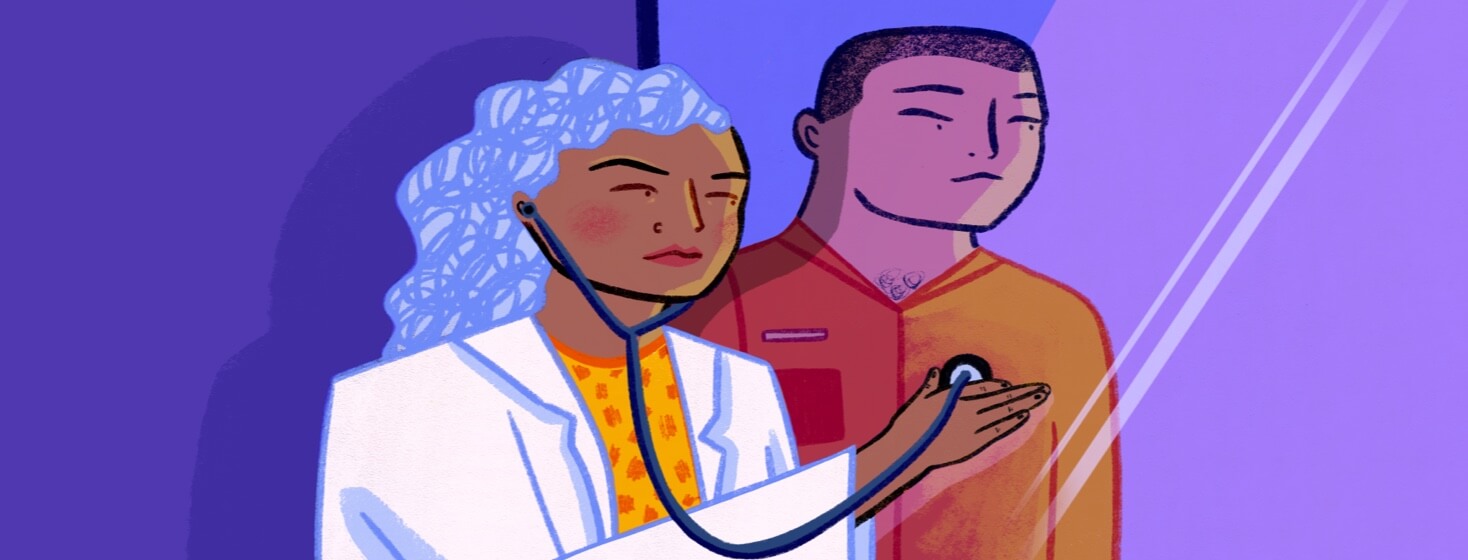Getting Medical Care for People Who Are In Prison
Medical care for chronic illness is challenging under the best circumstances. Doctor visits, multiple medicines, side effects, insurance woes, and daily symptoms pile up. These hardships are draining for anyone, and they are even worse for people living with chronic illness while incarcerated.
Incarceration and health
There are nearly 2 million people who are incarcerated in the United States. Living in close, confined quarters, people in prison have poorer health than the general population. About 50 percent of them report having a chronic disease. About 17 percent report having an infectious disease.1,2
The most common chronic illnesses among people in prison are:2
- High blood pressure (29 percent)
- Arthritis (17 percent)
- Asthma (16 percent)
Other chronic illnesses commonly found in the prison population include:2
- Cancer
- Diabetes
- Stroke
- Heart or kidney problems
- Liver cirrhosis
Infectious diseases commonly found in the prison population include:2
- Hepatitis B and C
- HIV/AIDS
- Tuberculosis
- Sexually transmitted infections
What healthcare is legally required?
Legally, people in prison have the right to get necessary healthcare. Each person should receive a physical exam when arriving and leaving a facility. They also can request a doctor’s visit at any time.3
Also, people who are incarcerated can expect confidentiality and consent in their healthcare. To ensure their health history is private, the facility should give them individual (not group) exams. Doctors must disclose information about any illness, causes, and possible treatment to them. People in prison are allowed to view their medical files and request second opinions.3
What healthcare is provided in reality?
Criminal justice facilities often fail to meet the legal standard of care for several reasons. The officers responsible for overseeing healthcare may not have a medical or public health background. Prison staff often ignore or delay requests to see a doctor by those who are incarcerated.4,5
Prison medical staff also may have restricted medical licenses. While outside hospitals or clinics require a clear license for employment, prisons may not. Finally, a person in prison cannot choose their doctor. They must work with the options the prison system provides.4,5
Drug protocols for chronic illness
Navigating the prison system with a chronic illness creates unique challenges. There are often restrictions on what drugs are available in criminal justice facilities. These drug limitations add to the limitations already imposed by insurance plans. As a result, many first-line drugs are not accessible to people in prison.6,7
Prison officials can reject drugs ordered by a doctor if they do not think they are needed. They also may resist offering treatment that requires regular hospital trips for infusions, lab work, and follow-up.6,7
What can loved ones do to help?
Watching a family member get sicker because they do not have proper care in prison is heartbreaking. But there are ways to work the system from the outside. Getting a loved one needed care means dealing with lots of red tape. Communication can be slow, but commit and keep going.8,9
Discuss your plans with your loved one before you begin. Your loved one will need to approve and prepare because retaliation against people in prison for outside advocacy is common.8,9
Provide medical records
Prison officials may not request the previous medical records of those living in their facilities. However, prison doctors need to have a complete medical history of each person's chronic illnesses.8,9
Contact your loved one’s regular doctor, and ask them to send their medical records or a summary to the prison’s chief medical officer. Your loved one will need to sign a release of medical records form first. Ask for a confirmation letter after the doctor's office sends the records. Insist they send the records through certified mail – you can offer to cover the costs if necessary.8,9
Create a paper trail
One of the most important things to do is put everything in writing. Whether you are writing a letter, sending an email, or making a phone call, keep notes and copies. Key steps to remember include:5,8,9
- Send everything through certified mail to ensure it arrives.
- Keep the certified mail receipts.
- Have your loved one make and send you a copy of their medical records (in prison and prior to their incarceration).
- Have your loved one retain and send copies of any medical appeals they have started.
- Date and copy any communication you send or receive.
- Print out emails sent or received from those in authority and your loved one.
- Create a phone log for phone calls that shows: The date and time of the call, who you spoke with and their title, a summary of the call, confirmation of when they will report back to you.
- Keep trying to contact prison officials if they fail to respond. Contact the next person in the chain of command if they stall.
- Consider seeking legal help. The American Civil Liberties Union (ACLU) is one resource.
- Do not give up!
For more information about health coverage for people who are incarcerated, visit HealthCare.gov.

Join the conversation